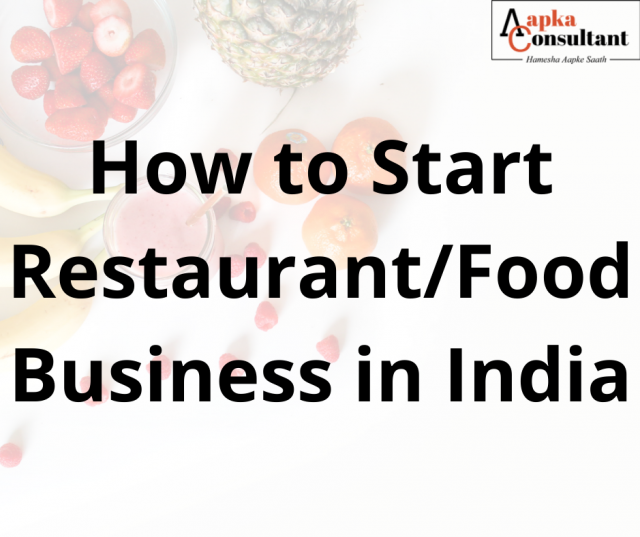Introduction
The most simple yet most authentic way to start your business in India is to start a food and/or restaurant business. We all are foodies in one way or another. As from north to south and from west to east we are very much diverse and so as our food . Almost all people like and love all kind of cuisines hence anyone can start a food business in India. It can serve the food legacy within the local vicinity or all across the border of the country. With a few basic ingredients (documentation and legal formalities) and a unique idea to serve your recipes one can start a restaurant and food business in India and can earn by becoming his/her own boss. We as Indians love to eat street food and like to try new restaurants and cafes at weekends with friends and family. Hence this idea is pretty workable and profitable to start the food business in India.
- How to Incorporate Food Business in India?
Let us first understand how to incorporate your business in India. To start any business, you can go with the following options as per the availability of the resources.
- Sole Proprietorship
- One Person Company
- Private Limited Company
- Partnership
- Limited Liability Partnership
Let’s discuss in brief each business entity: –
- Sole Proprietorship– If you are a single business owner that this is the best option to start with your registration. It is quick, simple and can be done with very less documentation and government interference. Moreover the owner has all the rights in decision making and can enjoy the profit in its entirety.
- One Person Company– This a new concept emerged from enactment of the Companies Act, 2013. It is a private limited company owned, operated and managed by one person only. This entity can enjoy all the benefits and work just like the private limited company owned by a single person. There are few exemptions with respect to compliances to this type of entity under the Companies Act, 2013.
- Private Limited Company– If you want to start a structured form of business with 2 or more persons than you can go with Private limited company. It requires enough financial, human and other resources to start off, run and manage the Company. There are few annual compliances also needs to be done on timely basis via professionals. The liability of the members of the company is limited to the extent capital contributed by them.
- Partnership Business- Two or more friends, relatives or any other persons having common idea can go for partnership registration. It requires a simple deed integrating all the terms and conditions of the partnership with respect to capital contribution, drawings, working, admission of partner etc. This form of entity is less expensive to register. The liability of the partners towards the business is unlimited and therefore this mode of business is bit risky.
- Limited Liability Partnership– This form of business is fusion of Private limited Company and Partnership business. It has characteristics of both types of business. LLP can be created with 2 or more persons but the liability towards the business is limited and therefore it is called as Limited liability Partnership.
- Tax Liability
After registering your business in any of the above forms you need to apply for Goods and Service Tax (GST) registration. It is a basic registration with the indirect tax authorities of the government of India. Unlike VAT and service tax registrations which treat goods and services differently, with GST all goods and services are treated at par. It also helps businesses to take benefit of input tax credit while paying the output tax liability.
Documents required for GST Registration –
- Certificate of Incorporation in case of private limited company;
- Authorized signatory’s photo;
- Stakeholder’s photo (Promoter / Partner);
- Proof of business address which includes electricity bill or property tax receipt or Municipal Khata Copy or legal ownership document;
- Proof bank accounts details which includes a copy of your bank statement, cancelled cheque, or the first page of your Pass Book
Once you done with basic entity and GST registration you can also take the following allied registration to boost your business.
- Protect your Brand Name (Intellectual Property Rights)
The most valuable asset of any business is its Brand Value, the brand that is innovated, created, nurtured, invested, marketed over the years of hard work and a huge amount of resource investment, the whole process takes quite a long time to establish a brand and stood distinguished in the market from that of others. A trademark registration gives businesses a strategic advantage over their competitors. Recognized Brand also helps the business to hit the global market and accrue benefits there from. Hence such a valuable intellectual asset of the business needs exclusive rights and shield to protect itself, which can be done via Trademark Registration at local and global forums. In the present blog, the Author has tried to familiar you with all the intricacies of Trademark, Online Trademark Registration and benefits of Trademark Registration.
- Quality Management Certification
ISO Certification: ISO/TS 22003:2013 : Food Safety Management System
To improve your business operations and/or to establish trust among your customers you can also go for ISO Certification. ISO Certification is valid for 3 years and it not only certifies the quality of your products or services but also creates goodwill among the general public.
- Legal Documents
- Website/Mobile Application Policy
Online business or e-commerce is no more a new concept in India now, every small or big, contemporary or traditional business has gone online. Where at one end online business desires an attractive yet simple and user-friendly website or mobile application at the other end the same requires a well-drafted, technically sound, and legally backed up website/mobile application policy. Website policy covers the entire business model its services, uses, facilitates and responsibilities, terms and conditions, privacy policy, cookies policy etc., and the User responsibilities and liabilities in simple and lucid legal boundaries.
A Vendor Agreement is a document that is made by and between the business owner and the service/goods provider who provides specific services or goods as per the requirement. It is one of the most important document or agreement to start any e-commerce or traditional mode of business in India. It set out all the terms and conditions related to the business or commercial transactions. This agreement creates a legally binding relationship between the Organizer (who provides the platform for selling goods or services) and the vendor. Vendor Agreement covers all the duties, liabilities, obligations, fee and commission, jurisdiction, etc. clauses to define and devise the relationship of either party.
Conclusion
These above registrations and documentation will help not only to set your business but also will help in business and goodwill growth and expansion. So if you are planning to start a new business than you can connect to the professionals of Aapka consultant they will help you to register and secure your business throughout the process.





![Legal Compliance for Starting Catering Business in India [Infographic] LEGAL COMPLIANCE FOR STARTING CATERING BUSINESS IN INDIA`](https://www.aapkaconsultant.com/blog/wp-content/uploads/2019/05/LEGAL-COMPLIANCE-FOR-STARTING-CATERING-BUSINESS-IN-INDIA-238x178.jpg)






